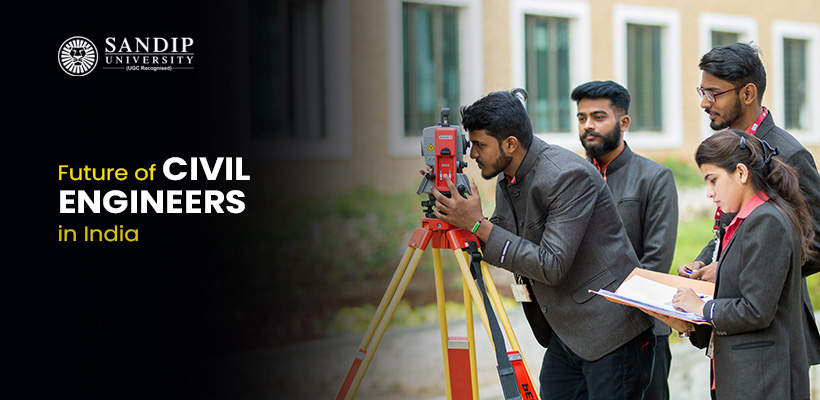Engineering is a very diverse field and civil engineering is one of its oldest branches. Civil engineering has been the backbone of human civilisation, leading to amazing inventions that help us lead a comfortable life. Civil engineering encompasses the designing, building, and maintaining natural and man-made structures which impact the future scope of civil engineering in India. These structures include buildings, bridges, railways, airports, dams, parks, gardens and many more.
B.Tech Civil Engineering and M.Tech Civil Engineering are the most popular degree programs that you can pursue for a grand career in the field. Civil engineering is divided into many branches. Some of the specialisations open to students pursuing postgraduate studies in civil engineering include construction management, structural engineering, town and country planning, environmental engineering, land valuation, and transportation engineering.
Current Scenario of the construction Industry in India
The Indian construction industry has witnessed a steady rise over the last few decades. There has been a significant increase in the number of commercial, residential and infrastructural projects across the nation. The Central Government of India is also heavily investing in infrastructural development in various Indian states.
The Indian construction industry is currently valued at 250 billion USD, and is speculated to grow at an annual rate of approximately 8%, reaching 530 billion USD by 2027. So if you apply for a B.Tech in Civil Engineering program this year, you will be ready to join the industry by 2027 with a massive scope and lucrative salary.
The COVID-19 pandemic has not been able to halt or slow down the growth of the construction industry in India. The Indian economy is at an all-time high right now and this will boost investments in the construction industry.
Future Scope of Civil Engineers in the Indian Construction Industry
The future of the Indian construction industry seems bright without a doubt. By 2030, over 40% of the nation’s population is expected to settle in urban cities as compared to 33% of the population living in urban cities currently. Over the next decade, the Indian construction industry is all set to touch 1.4 trillion USD.
The Central Government’s Smart City Mission will lead to the creation of 100 smart cities with futuristic infrastructure, residences, recreational facilities and more. The demand for well-trained civil engineers holding qualifications from some of the best civil engineering colleges in Nashik is on an all-time high currently. This demand is all set to increase in coming years as well.
Commercial and residential properties developed by private construction companies are also increasing. With the increase of the standard of living in urban cities among the middle and upper middle class, the construction of swanky and modern homes is on the rise. These projects need well-qualified and skilled civil engineers to stand apart from their competitors in the market.
Career Opportunities in Civil Engineering
There are many career opportunities available for civil engineers today. These professionals can work in various public and private sector organisations with the right qualifications. Here are some of the organisations that recruit civil engineers in India:
Public Sector Companies
Border Roads Organisation, National Highway Authority of India, Jal Boards, Public Works Department, Municipal Corporations, Airport Authority of India, Metro Rail, Indian Railways, Indian Air Force, National Thermal Power Corporation, Oil and Natural Gas Corporation Ltd., Pollution Control Boards, etc.
Private Sector Companies
Shapoorji & Pallonji Group, Essar Group, Reliance Infrastructure, Larsen & Toubro, IRCON International Ltd., Jaypee Group, Nagarjuna Construction Company Ltd., Godrej Group, Tata Housing, Raymond Realty, Piramal Realty, Hindustan Construction Company, Gammon Infrastructure Projects Limited, Consolidated Construction Consortium Ltd., etc.
Top Career Opportunities for Civil Engineers
- Civil Engineer
- Environmental Engineer
- Building Valuation Surveyor
- Construction Manager
- Contracting civil Engineer
- Design Engineer
- Fire Risk Assessment Officer
- Land Value Estimator
- Nuclear Engineer
- Site Engineer
- Civil Project Manager
- Structural Engineer
- Water Engineer
Skills Needed to Become a Successful Civil Engineer
Civil engineering is a hands-on field which requires immense skill and talent. Professionals need to have a number of hard and soft skills to make it in this field. Here are some of the top skills you will need to make it as a civil engineer:
- Civil engineers must have relevant technical skills like proficiency in physics and mathematics.
- They should know how to use CAD tools to design projects efficiently.
- Civil engineers should know how to manage a project from start to completion, and should have relevant leadership skills to manage a team.
- Teamwork and organisational skills are necessary to make sure that tasks are completed in a timely manner without compromising on the team’s overall well-being.
- Critical thinking is important for civil engineers as they will be faced with many critical problems on a daily basis and they will have to find proper solutions for the same.
- Communication skills are necessary to communicate efficiently with team members, clients, and other departments within the organisation.
- Civil engineering is a tough field and so you should be able to work under pressure and on tight deadlines.
Conclusion
These points should give you a general idea of civil engineering’s future scope. The future is quite bright for civil engineers in India holding qualifications and training from some of the top civil engineering colleges in Nashik.
Such colleges generally have specialised subject-wise labs to provide students with hands-on training. They also offer 100% placement assistance through annual placement drives. You can do some research and look for such colleges to gain industry-relevant training in the field. Good luck!

